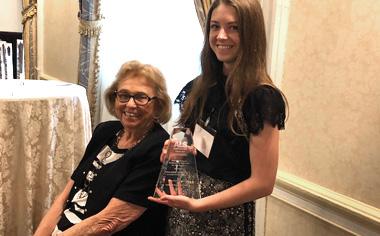2014 Milton Safenowitz Postdoctoral Fellowship Program for ALS Research Recipients

The Association is proud to support the development of bright, young scientists through the Milton Safenowitz Postdoctoral Fellowship. The Safenowitz family, through The Greater New York Chapter of The ALS Association, founded the award in memory of Mr. Safenowitz, who died of ALS in 1998. These awards are to encourage and facilitate promising young scientists to enter the ALS field. Fellows work with a senior mentor and receive extensive exposure to the ALS research community through meetings and presentations. After completing this fellowship, approximately 90 percent of the awardees stay in ALS research. They go on to establish their own laboratories to continue studying ALS and mentor more ALS researchers along the way.
Veronique Belzil, Ph.D.
Mayo Clinic College of Medicine, Jacksonville, Fla.
- Title: Characterizing the contributions of epigenetic changes in C9FTD/ALS
- Summary: Dr. Belzil and colleagues are focused on discovering novel ALS biomarkers for people carrying C9orf72 expansion mutations. She conducted numerous tests looking at both RNA signatures and epigenetic changes, meaning alterations to DNA that can switch genes on and off and affect gene expression. The goal is to generate a complete signature profile of C9orf72 expansion carriers and people living with sporadic ALS. This will lead to identifying key players in ALS, characterizing the interplay between the key players and identifying specific ALS biomarkers.
Claudia Fallini, Ph.D.
University of Massachusetts Medical School, Worcester, Mass.
- Title: Characterizing the pathogenic role of TDP-43 in PFN1-linked ALS.
- Summary: TDP-43 and PFN1 mutations are familial genetic causes of ALS. Dr. Fallini and colleagues set out to understand how mutant PFN1 affects cytoskeletal dynamics, RNA binding and post-transcriptional mRNA regulation. She found that both cytoskeletal dynamics and mRNA regulation are both biological pathways that impact motor neuron dysfunction in ALS.
Florent Laferriere, Ph.D.
University of Zurich, Zurich, Switzerland.
- Title: Contribution of protein aggregation in the pathogenesis of ALS: seeding, spreading and toxicity
- Summary: The goal of this study by Dr. Laferriere and colleagues is to characterize the size and density of ALS inclusions (clumps of protein that aggregate together) that are commonly seen in ALS and to understand how they form. Further studies will validate the presence of aggregated proteins in ALS cells and in the post-mortem brains and then compare differences to understand how they spread and cause toxicity.
Ke Zhang, Ph.D.
Johns Hopkins University School of Medicine, Baltimore, Md.
- *Funded by the Greater Philadelphia Chapter of The ALS Association
- Title: The role of nuclear transport defects in the pathogenesis of ALS/FTD
- Summary: Dr. Zhang discussed how nuclear-cytoplasmic transport (movement of proteins and RNA in and out of the cell nucleus) defects cause ALS/FTD and how this pathway can be a potential target for ALS/FTD. These studies were published in the journals Nature and Nature Neuroscience in 2015. (insert pubmed link and link to our news release)
Philip McGoldrick, Ph.D.
University of Toronto, Toronto, Ontario
- Title: Pathomechanisms of C9orf72 in real time
- Summary: The goal of Dr. McGoldrick’s study is to understand the difference between two types of C9orf72 expansions – the short form and the long form. In addition, he is looking at how different ALS disease mechanisms can converge to cause toxicity.
